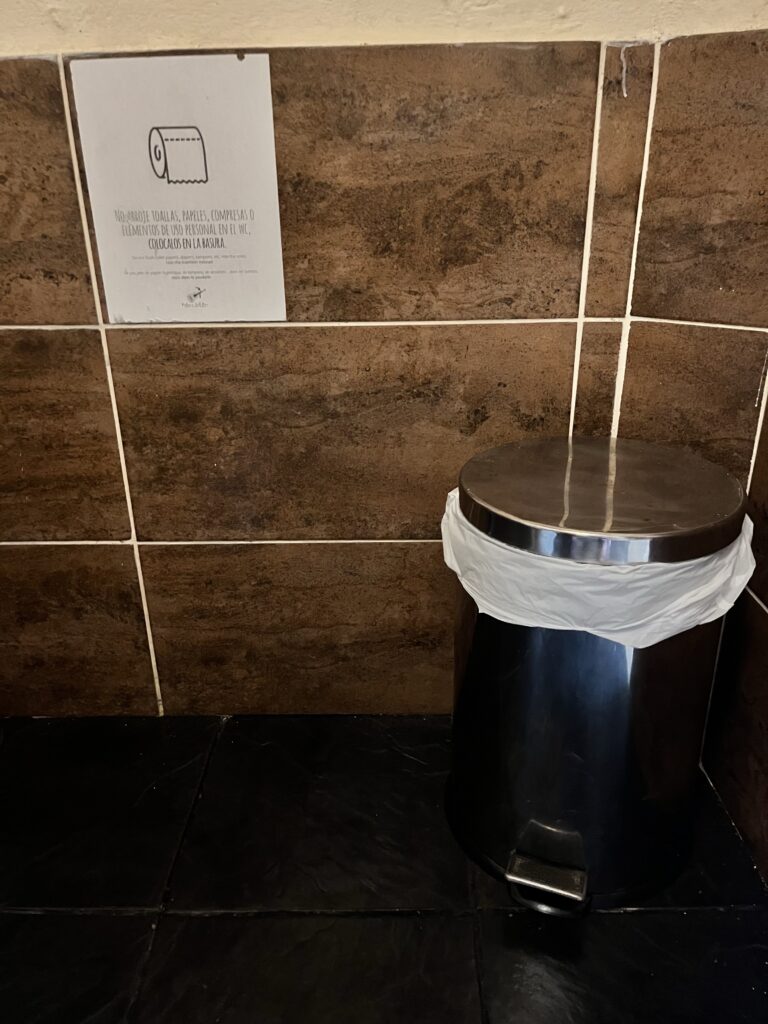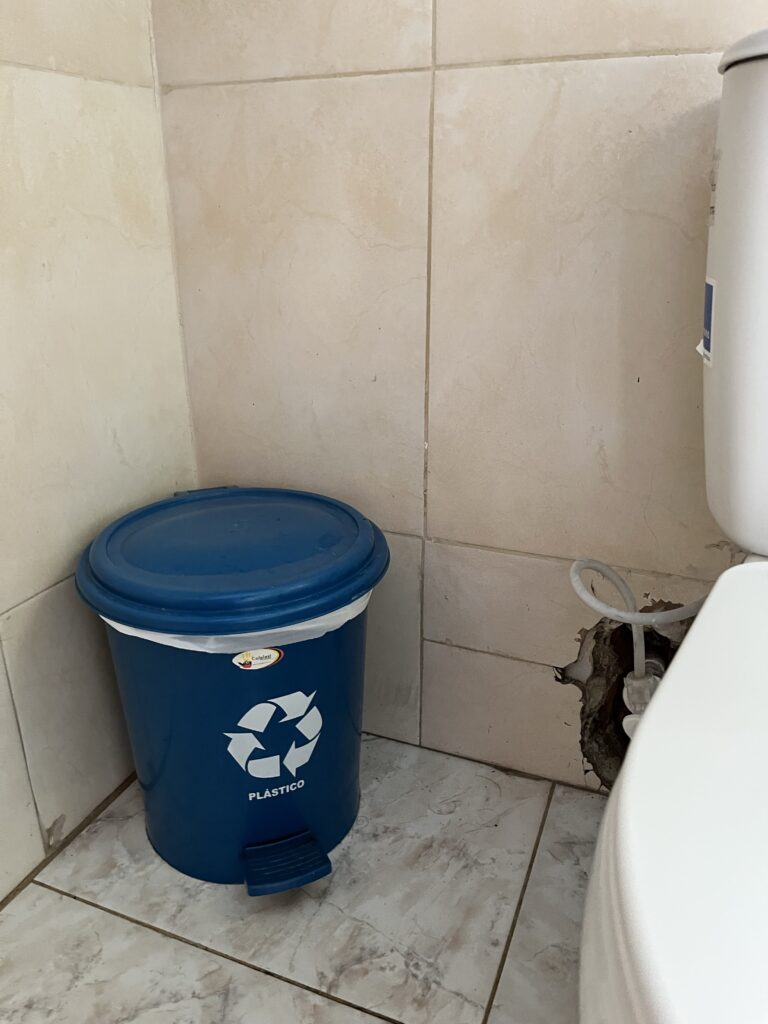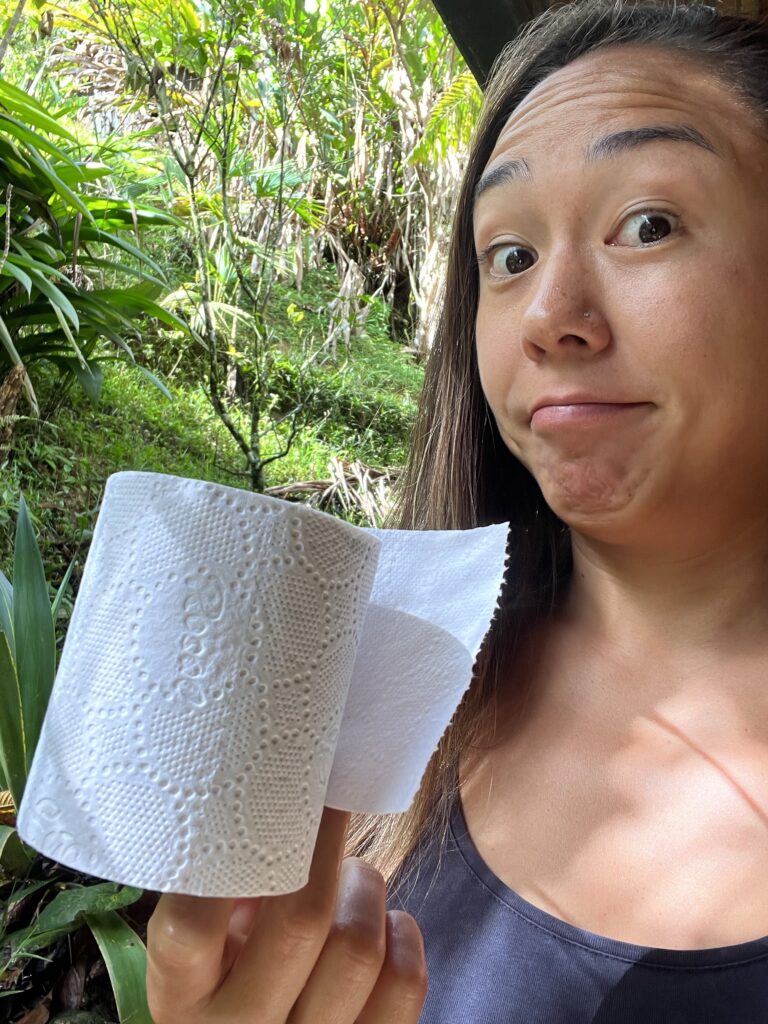If you visit Latin America, don’t flush your toilet paper. Just don’t. To those of us who are used to dropping it right into the toilet after use, this might initially seem very strange. But throughout Latin America, even in very developed areas, it’s normal to throw away used toilet paper in a trash bin. This bin is placed within convenient reach of the toilet. It might have a lid, it might not. You have a good chance of seeing somebody else’s crumpled, poo-stained discards in there. You might feel the urge to strategically fold or place yours so other people don’t see it. (Out of some sense of demureness? Or shame? Lest the next occupant play detective and determine which anonymous dirty tissue belonged to you?) That’s fine. Just don’t flush it.
Why not? Actually, in most of the world, flushing toilet paper is not a thing. In the US, we just happen to have powerful toilets and bigger sewage pipes. In Latin America, the pipes have a smaller diameter, and flushing your toilet paper is likely to cause a clog.
I was fortunate to be tipped off to this custom before I began my travels. Last year I was talking with a friend who told me that when she was growing up in Arizona, her Mexican parents taught her to always throw her toilet paper in the trash. Despite living for many years in the US, they couldn’t quite place their faith in the plumbing system of their adoptive home. When I was researching my trip, I also saw some people who mentioned the toilet paper protocol on Reddit and others listed it in blog posts with titles like “10 Things You Should Know BEFORE You Go To Guatemala.” So, when I went to Guatemala, I wasn’t shocked.
Lost in Translation

One thing to keep in mind: Sometimes the signage can be confusing. Don’t get complacent. In baños that frequently accommodate foreign butt cheeks, they’ll usually post signs similar to the ones we often see in bathrooms in the US. Ours usually say something like, “Please don’t flush tampons, wipes, paper towels, hopes and dreams, etc.” (Side note: If you’ve been flushing your tampons, it’s time to stop.) In Latin America, the bathroom signs in touristic areas are often written in both Spanish and English, and the Spanish version says something like, “Por favor no tire papeles o productos femeninos en el inodoro,” which is then translated directly into English as, “Please don’t throw papers or feminine products in the toilet.” This is just a theory, but I think that the fact that so many of these signs neglect to say “Don’t throw toilet paper in the toilet,” is probably the cause of a lot of plumbing issues. Like if you’re coming to Peru from Michigan and you make your first trip to the bathroom, you might read a sign and say to yourself, “Papers, huh? No problem, I never throw my newspapers, letters, or biology notes in the toilet,” and proceed to flush your toilet paper. Don’t be that guy. Also, the absence of a sign does not mean that you can flush it. You should always assume that if there is a trash bin in there, it’s for the toilet paper.

Potty Re-Training
Despite coming in with advance notice, I found that dropping my toilet paper into the toilet was a difficult habit to break. It’s something that I used to do on autopilot, without conscious thought. For the first couple of weeks, I’d have to talk to myself as I was in the bathroom, Don’t flush the toilet paper, don’t flush the toilet paper, don’t flush the toilet paper. But there were still a few times that I messed up. Early on, I know there were at least two times where I didn’t even realize that I’d flushed the toilet paper until I was leaving the bathroom.
There have also been probably four times where I realized my mistake as soon as I dropped the toilet paper in, and had to lightning-speed grab it, squeeze out the pee-water, and toss it in the trash. And then wash my hands with a surgeon’s precision. You might call this over-commitment, but I really do not want to be responsible for some kind of sewage disaster in a foreign country. Have you ever clogged a toilet at a friend’s house? Now imagine that embarrassment, but now it’s not your friend, and rather some near-stranger with whom you are staying, and the solution might require more than a plunger. Hard pass. I will squeeze the pee-water.
One of these inglorious instances took place during my mid-morning break at Spanish school in Antigua. I returned to my lesson, and explained to my teacher in Spanish what had happened. She got a real kick out of that, and we laughed about it together. So, looking on the bright side, not only was it an opportunity to practice my language skills in a novel context, but it was also a chance to talk about cultural differences.
Now, perhaps you’re still saying, “Sachi, that is disgusting, and you are crazy,” and perhaps you aren’t wrong. But on the off-chance that I’ve saved you from a future sewage calamity, you’re welcome. Not all heroes wear capes.

I can relate 🫤🤦🏻♀️
I had the opposite problem-—when I got back to the US I was constantly looking for the little trash can to make my deposits
I’ve had this thought many times when flushing here in the US; how there must be a better way to deposit tp so pipes last longer
Thanks for the information, definitely good to know for future travels!!